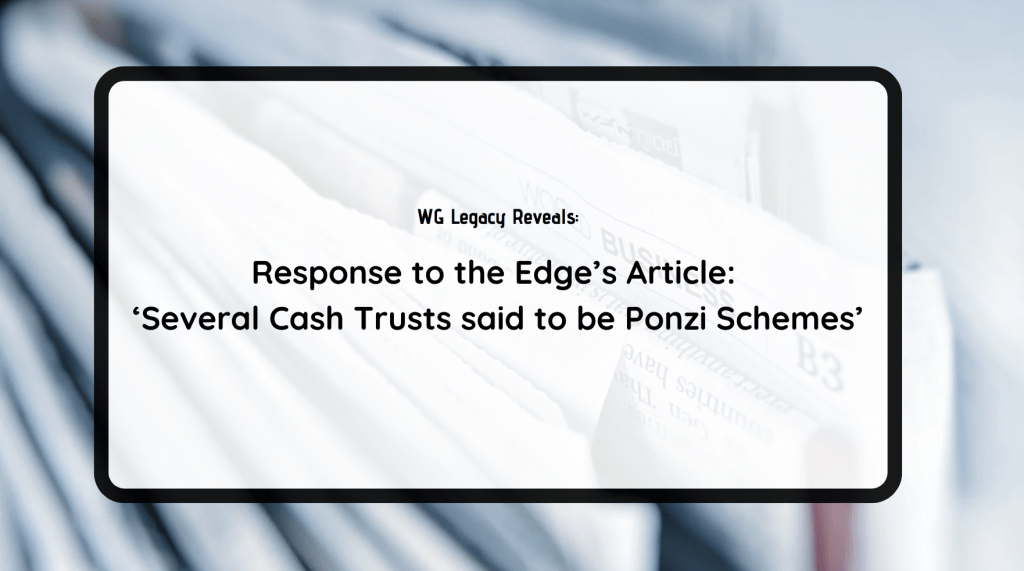On 24 May 2022, I read an article on the Edge titled, ‘Several Cash Trusts said to be Ponzi schemes’. Of which, I find that this is a genuine concern as trustees are an integral part of our nation’s financial ecosystem. Thus, as an estate planner, I decided to write my response and offer my views on this article and as well as a related article that was titled, ‘Industry groups say cash trust issue made known to regulators’ as candidly as possible.
They include:
#1: ‘Grouses’ to Kepong MP, Lim Lip Eng
First and foremost, if certain cash trusts are suspected to be Ponzi schemes, the question is, ‘Why do the four bodies bring this matter to DAP, a political party?’. Shouldn’t the four bodies highlight the issue to the relevant authorities namely, Bank Negara Malaysia and the Securities Commission for investigation?
To which, the Malaysian Financial Planning Council (MFPC) responded swiftly to deny its intention to bring such grouses to MP Lim as stated in a latter article. In that article, MFPC further questioned the origins of such ‘intentions’ and stated that it raised the issue to Bank Negara Malaysia and Securities Commission. The response from MFPC is relatively sensible, in my personal opinion.
#2: Comparison to Maybank’s FD rates and its Dividend Yields
Personally, I find the comparison made between cash trusts, FDs, and dividends from a stock (Maybank) to be not meaningful.
Each vehicle has its pros and cons and has its place in one’s financial plan.
For instance, a cash trust is basically an estate planning product, not so much of an investment product. So, how could you compare a cash trust with stocks and FDs? As such, I believe it is best to understand your objectives of forming a cash trust before doing so.
#3: Charles Ponzi and Bernie Madoff
Next, the article mentioned both names and offered a brief explanation of how Ponzi schemes work. While this is educational, the important question to ask is, ‘How do cash trusts resemble a Ponzi scheme?’. What are the similarities which are obvious between a cash trust and a Ponzi scheme in their mechanisms?
That was not explained clearly in the article.
#4: MP Lim’s Opinion on Cash Trusts
The article then proceeded to report two remarks made by MP Lim on the issue of cash trusts. Personally, I believe MP Lim is totally entitled to his views and his stance on the matter discussed. Here, I would just add to the following:
First, I believe it is up to the relevant authorities to decide on the validity and as well as the legitimacy of a certain cash trust. Second, in regards to his comment on a lack of proper regulation, I have a different opinion on this. This is because all trustee companies in Malaysia are governed by the Trustee Act 1949 and the Trust Companies Act 1949. Therefore, it means that we have proper regulations in place to govern trustee companies in Malaysia.
#5: Statements of ‘One Such Company’s Website’
Next, the article stated the features of a cash trust from a trust company and as well as details of that particular trust company. The information is accurate as it is sourced from that trust company’s website. But, what does it suggest? Here, I would question the intention of the author for reciting these information. From these information, how does this link or have connections to a Ponzi scheme?
Then, the article listed a series of criteria to set up a trust company. So again, as a reader of this article, what are their relevance to a Ponzi scheme?
Finally, the article stated another trust company in brief and ended with a small remark, stating that these trust companies are well-connected and ‘brazen’. For this comment to be published, does it suggest that all cash trust operators are a scam, dodgy and illegitimate? Or, is this article suggesting that there are maybe one or two bad apples that are operating in an illegitimate manner?
It is one thing to say that a few trustee companies aren’t doing things right.
It is another to suggest that all cash trust products in Malaysia are just bad.
Here is my take:
The first cash trust product was launched by Amanah Raya Bhd, a trustee which is fully-owned by the Malaysian government. The product continues to exist as I write. Thus, I am in the view where the setting up of a cash trust is legitimate in Malaysia. Otherwise, why would Amanah Raya Bhd offer this product?
Conclusion: An Honest Take on this Article
Personally, the Edge is a reputable financial daily that is still contributing greatly to our financial community. With such a reputation, it is crucial to be aware and understand that there is power in print, be it online or offline. The choice of the titles, contents and style of writing have consequences on people, business and industry collectively.
Based solely on this article, I concluded that the author didn’t offer a discussion on how a cash trust is similar or linked to a Ponzi scheme, which is suggested by the title of the article itself. I believe this article could have been more useful or educational if it could bring awareness of the following:
1. Is the formation of cash trust legitimate in Malaysia?
2. If a cash trust could offer some returns to its settlor, how does it do so?
3. The differences between a legitimate cash trust and a dodgy one.
4. If there is a suspicion of foul play, what are the avenues to seek assistance?
Overall, I believe all parties are responsible and have roles to play in building up our nation’s financial industry. This includes financial publications. It would be a positive move for publications to be more tactful and educational. Also, I would say that more education from legitimate financial bodies on this matter is really needed in order to promote good estate planning practices among Malaysians.
If you have any questions on this topic, please feel free to contact me or to post your questions below.




